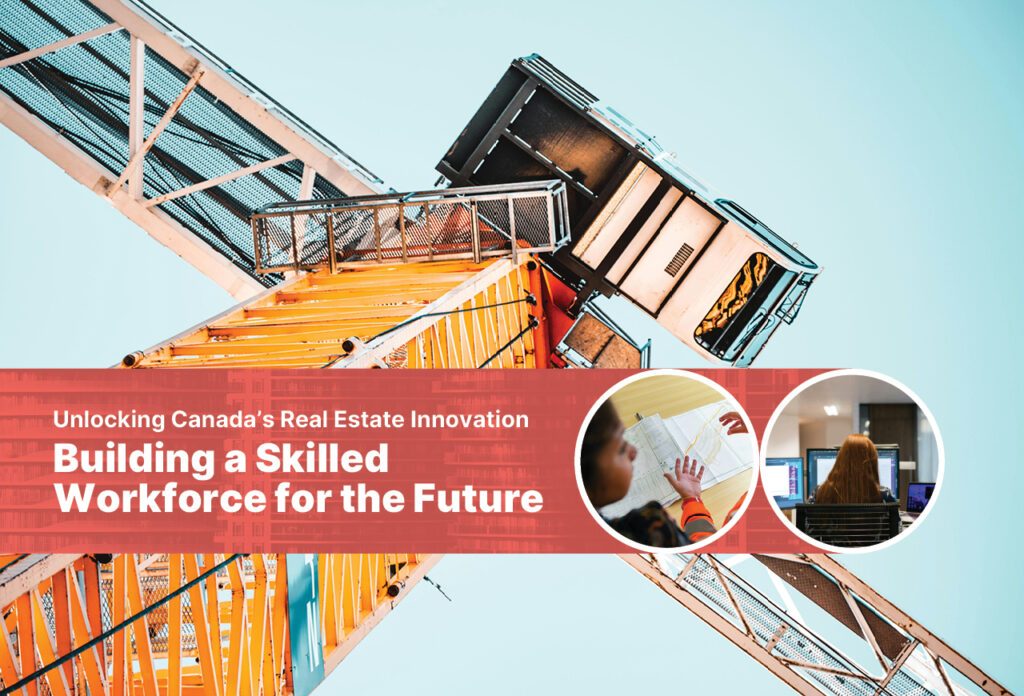Canada’s real estate sector is a cornerstone of the economy, but it faces a number of complex challenges. The recent Innovation Industry Agenda Report released by The Industry Innovation and Transformation Council, outlines the five pressing issues facing the industry today from low carbon and climate resiliency to housing affordability.
Innovation is key to overcoming these hurdles, but the real estate and construction industries face a critical roadblock: a skills and labour shortage.
Canada faces construction labour challenges
The Canadian Mortgage and Housing Corporation has estimated that Canada needs to build an additional 3.5 million homes above the business-as-usual case before 2030 to restore affordability to the market. These homes are above and beyond the 1.66 million that the CMHC forecasts will be built during this period, requiring the construction of 5.1 million homes – triple the current rate of housing completions.
But labour shortages are a significant challenge for the real estate sector and puts this ambitious goal at risk. In the second quarter of 2023, there were more than 62,000 job vacancies in the construction industry – a job vacancy rate in the sector of 5.1 percent compared to the 4.4 percent vacancy rate across the economy.
Innovation across policies, systems, products and processes will be required in order for Canada to meet this ambitious goal – but without the labour needed to execute the work, it will be impossible to meet the demands.
New skills required to drive innovation
In addition to having people to do the work, it is also essential that the real estate sector has the skills needed to drive innovation.
Innovation requires a complex mix of skills such as creativity for problem-solving; continuous improvement to identify challenges and iterate; and risk assessment. Social and emotional skills such as communication, relationship building, team- and client-oriented skills are also required, as well as digital skills that range from general to advanced.
As the construction industry evolves to integrate technology, industry professionals will need a new set of skills. Digital tools for project management, collaboration and communication are fast becoming mainstays on job sites. And as new building processes and materials are developed, they require technical skills to execute.
At the leadership level, innovation relies on managers with the skills to identify opportunities and implement and manage innovation. For many Canadian firms, the lack of leadership is one of the most critical impediments to our ability to commercialize innovations, integrate and compete in international markets, and ultimately grow local, innovative companies.
A multilayered approach to skills development
Increasing skills and training across the sector will require a multilayered approach to meet demand which may include:
- A robust regional lens to fostering skills for innovation as skills supply, demand and the capacity of education training and institutions vary from region to region.
- Strategies to inform short- and-long term planning to identify the skills firms need, where significant gaps exist and what education and training are required to address shortages.
- Collaboration between local firms and education and training providers to identify skills deficiencies and devise solutions to building and fostering a pipeline to meet industry demand.
Increasing capacity, resources and willingness for firms to engage in support skills training for their staff to ensure they can successfully innovate.
Ending the stigma around trades and positioning the construction industry as offering good paying jobs and security with potential for career advancement are also keys to increasing the workforce.
“The trades offer endless opportunities,” wrote Richard Lyall, CEO of the Residential Construction Council of Ontario (RESCON) in an op-ed for On-Site Magazine. “We must keep pushing programs and strategies to encourage more individuals to take up the tools. We are at the point where we can no longer just talk about the challenge and hope for the best. We must now pull out all the stops and walk the talk.”
Committing to innovation
Representing residential builders across Ontario, RESCON seeks to drive innovations in the residential construction sector in a wide array of projects, in collaboration with many industry and research partners. As an Engaged Innovator, the organization has pledged to contribute to the ideation and validation of at least one novel real estate solution or pilot project.
RLABS is calling on organizations and individuals to commit to taking leadership on driving innovation to help solve Canada’s most pressing housing and real estate issues. Share a pitch to join our community of changemakers and make a commitment to bring transformative change to the real estate and housing industries.
Skills and labour are among the most critical enablers of innovation – the current shortages represent a significant challenge for innovation across the sector. While skills and labour shortages often intersect, they are distinct and represent unique challenges for the sector.
Real estate firms engaging in innovation will not only require workers but will need to be equipped with leadership skills to manage innovation and the technical and complementary skills needed to drive innovation.

























